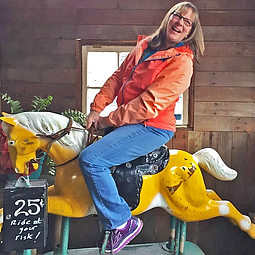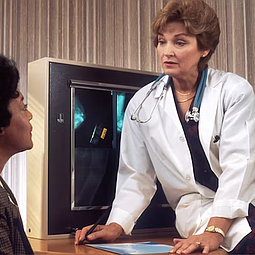New Discoveries in the Search for the Fountain of Youth
July 29, 2011 at 3:34 p.m.
Life expectancy in the U.S. is about 80, but with the surge of centenarians in our midst, 100 seems to be the new 80. Information abounds on the subject of longevity and research reveals more about the aging process every day . . . along with tantalizing glimpses of the fountain of youth.
AARP The Magazine recently examined cutting-edge research and what some "far-out" visionaries see in the realm of the human lifespan. "When I'm 164" (by Anft, Carlson, Dudley and Manjoo, Nov/Dec 2010) examines the world according to futurist Ray Kurzweil, who describes the possibilities of tiny "nanobots" that repair aging cells which will vastly extending life spans. He even sees a time when our conscious selves will live inside powerful supercomputers, providing virtual immortality. Kurzweil is no crackpot. He is considered to be one of the world's leading inventors, thinkers and futurists, "with a twenty-year track record of accurate predictions." Inc. Magazine described him as the "rightful heir to Thomas Edison."
Arlene Weintraub, author of Selling the Fountain of Youth: How the Anti-Aging Industry Made a Disease Out of Getting Old—And Made Billions, explores the brave new world of the anti-aging industry. "A business that used to revolve around powder and paint—subtle agents to enhance beauty and help one age gracefully—has been overrun by steroids, human growth hormone injections, plant-based bio-identical hormones, and never-ending web ads for red wine extract." Weintraub, who spent more than ten years as a science reporter at BusinessWeek tells Christie Findlay (AARP Bulletin, Jan 13, 2011) that these treatments are unproven and may raise the risk of cancer and other diseases. "Watchdog groups accuse antiaging doctors of promoting dangerous treatments without warning patients of potential risks." Weintraub's best advise for those seeking the fountain of youth? Exercise!
The research backs her up. While your genetics play a role, most of the "secrets" of longevity remain the same as in your grandmother's day. Yes, living a long and healthy life comes with same old advice - the "how-to's" include a healthy diet, regular exercise, connecting with others and managing your stress. Behaviors – things you can control – are a key piece of the puzzle.
Super Agers – the Genetic Connection
In November, the Albert Einstein College of Medicine launched SuperAgers.com, a new website that features the latest information on more than a decade of aging research at Einstein.
"The goal of the Longevity Genes Project is to understand how centenarians live so long," said Dr. Barzilai, Director of the Institute for Aging Research at the college. "What is it in their genetic makeup that allows them to get to this age and remain healthy?"
To date, the team has enrolled more than 500 centenarians and near-centenarians, and more than 700 of their children.
The site features video profiles of remarkable centenarians and near-centenarians who are taking part in the study, including: 96-year-old Lilly Port, who continues to travel the world; 104-year-old Irving Kahn, who works every day managing assets at his $700 million investment firm; 103-year-old Irma Daniel, who exercises and maintains an active social life; and 98-year-old Harold Laufman, a talented artist, musician and retired surgeon.
The research is beginning to unlock the genetic code for longevity and identify markers that protect against age-related diseases, reports Dr. Barzilai. Among the findings to date:
- Identifying three or more genes thought to promote longevity;
- Evidence that longevity is highly likely to be inherited from generation to generation; and
- The finding that those with exceptional longevity are more likely to have significantly elevated levels of HDL or "good" cholesterol.
It is believed that the combination of these factors plays a key role in the ability of these "super agers" to avoid cardiovascular disease, insulin resistance and high blood pressure.
As the study continues, Einstein researchers are hoping to better understand how protective or harmful genes are activated, or "turned on" or "turned off." This could lead to therapies to help people live longer, healthier lives by mimicking the beneficial effects of longevity genes.





